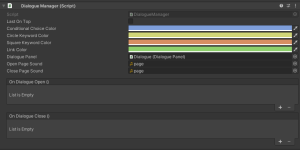LastOnTop
LastOnTop Property in DialogueManager Class
Overview
The LastOnTop property in the DialogueManager class is a setting that determines the display order of dialogue windows when multiple dialogues are open simultaneously. It's a crucial feature for managing dialogue visibility and prioritization in the game.
Description
- Property Type:
bool - Functionality:
- When this property is set to
true, it ensures that the most recently opened dialogue is always displayed at the top of the dialogue stack. - This prioritization makes the newest dialogue the most visible and immediately accessible to the player, which is particularly useful when the game requires quick player responses or attention to the latest information.
- When this property is set to
Usage
The LastOnTop property is particularly useful in gameplay scenarios where multiple dialogues are open at the same time. Setting this property to true ensures that the most recent dialogue is the focal point for the player, preventing older dialogues from obscuring it.
Example of Usage
public class DialogueManagerSetup : MonoBehaviour {
void Start() {
// Setting the LastOnTop property to ensure the newest dialogue appears on top
DialogueManager.LastOnTop = true;
}
public void OpenMultipleDialogues() {
DialogueManager.OpenDialogue("Initial Message", "This is the first dialogue.").AddChoice("Ok");
DialogueManager.OpenDialogue("Important Update", "This is a more recent, important dialogue.").AddChoice("Ok");
// The "Important Update" dialogue will be displayed on top
}
}
Description:
- In this example, the
LastOnTopproperty is set totrueto ensure that the most recent dialogues are displayed above older ones. - The
OpenMultipleDialoguesmethod demonstrates how newer dialogues ("Important Update") will appear on top of earlier ones ("Initial Message"), making them more visible to the player.
Remarks
- The
LastOnTopproperty is crucial in games with intricate dialogue systems, where managing the visibility and order of multiple dialogues is key to the player experience. - Proper use of this property can enhance gameplay by ensuring that critical information in dialogues is not missed by the player.
- It's a valuable feature for narrative-driven games, adventure games, or any genre where dialogues play a significant role in gameplay and storytelling.

